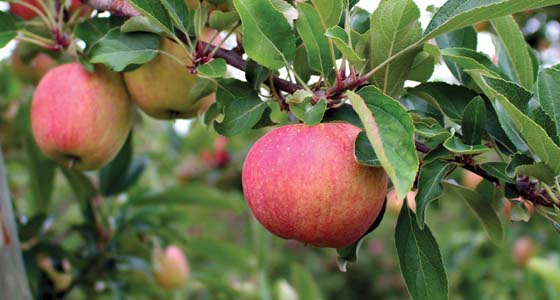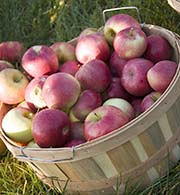Growth Tops the Agenda for Michigan Food and Agriculture
Online Exclusive

Start a discussion on the topic of Michigan’s economy, and the first things that spring to mind are not necessarily positive. The state has many economic challenges—unemployment, a declining population, and high labor costs. In a December 2012 Forbes magazine ranking of “Best States for Business and Careers,” Michigan was near the bottom of the list.
But Michigan has been working hard over the course of the past several years to create an environment that is more business-friendly, and the importance of the agri-food industry is well recognized by state officials. The agri-food system has grown by more than 60% over the past decade and employs nearly one million Michigan residents, accounting for 22% of the state’s employment, according to Michigan State University statistics.
Under the leadership of Governor Rick Snyder, who took office in 2011, Michigan has streamlined its complicated business tax system and adopted a new flat tax of 6%. In 2012 the state became the nation’s 24th right to work state, which means that employees can’t be required to join unions and pay union dues. According to economic development officials, many foreign companies seeking to bring a business into the United States won’t consider a state that is not right to work.
Michigan’s economic development team says the state has rebounded from the Great Recession of 2007—2008 more quickly than many other states, and sources like the newsletter 24/7 Wall Street, which this year ranked the state No. 1 on the criteria of “most recovered,” reinforce that. Also this year, Site Selection magazine rated Michigan as the eighth most competitive state for spurring business growth.
Recently, the Michigan Economic Development Corp. invited a group of food industry editors to the state for a close-up look at some of the initiatives that have allowed the food and agriculture system there to grow by about $20 billion between 2009 and 2012, reaching the current total of $91 billion in annual economic activity. Michigan officials hope to see that total climb to $100 billion by 2015. Here’s a look at what the state has done over the course of the past couple of years and a preview of what’s ahead.
 Cultivating Agricultural Exports
Cultivating Agricultural Exports
Food/agriculture is the third-largest contributor to the Michigan economy after the automotive industry and tourism. According to the Michigan Dept. of Agriculture & Rural Development (MDARD), Michigan produces in excess of 300 commodity crops commercially, making it second only to California in terms of agricultural diversity.
Expanding the agricultural export market is a major objective for the state. State officials are working to educate Michigan producers about export market opportunities and to bring more international buyers to the state for a close-up look. Michigan’s agriculture exports climbed 21% to $2.8 billion in 2011, the most recent year for which data is available.
Developing the huge Chinese market, which is already becoming a good customer for dried fruit and soybeans, is a major focus for the state, reports Jamie Zmitko-Somers, International Marketing Program Manager. She notes that the governor has traveled to China for this purpose for each of the past three years. Currently Michigan’s top exported commodities are soybeans, corn, wheat, dairy products, and fruit. Top export markets are Canada, Mexico, Japan, South Korea, and China.
--- PAGE BREAK ---
Food Processing in Michigan
According to Mike DiBernardo, an economic development specialist for the state, Michigan has created 88,100 manufacturing jobs between 2008 and early 2013, which is three times the average of the nation’s top 20 states in job creation. About 1,000 of those jobs are in food manufacturing.
The Michigan food processing industry generates nearly $25 billion in economic activity annually. Among the companies that have made significant recent investments in their Michigan facilities are Pinnacle Foods, ConAgra, Post Foods, and General Mills. Other companies that have operations in Michigan include Domino’s Pizza, Eden Foods, Honeybaked Ham Co., and Leprino Foods.
Among the state’s food processing innovators is Materne, a French company that recently announced plans to begin domestic production of its GoGo SqueeZ, a fruit-in-a-pouch product targeted to kids, in a new facility in the state. Materne partnered with Michigan fruit processor Cherry Growers Inc. on the venture and has entered into a 15-year supply agreement for infrastructure, services, and apples. This project is expected to create 72 new jobs.
The list of Michigan food industry success stories includes the following enterprises.
 • Michigan’s No. 1 Regional Ice Cream Brand. Operating successfully as a midsize player is family-owned Hudsonville Creamery & Ice Cream Company, Holland, Mich. The company has been making ice cream for nearly 90 years, and Hudsonville currently is the best-selling regional brand in Michigan, reporting double-digit annual sales growth.
• Michigan’s No. 1 Regional Ice Cream Brand. Operating successfully as a midsize player is family-owned Hudsonville Creamery & Ice Cream Company, Holland, Mich. The company has been making ice cream for nearly 90 years, and Hudsonville currently is the best-selling regional brand in Michigan, reporting double-digit annual sales growth.
After opening a state-of-the-art production facility in 2004 by repurposing an automotive die-casting facility, the company has expanded product distribution into the neighboring states of Ohio, Illinois, and Indiana. Management is looking for “controlled growth” and won’t stray far beyond its core line of premium ice cream, according to Director of Manufacturing Cary Grover. “We’ve settled into our niche, and we want to do it well,” says Grover.
The company capitalizes on its Michigan heritage in a variety of ways. All of the milk used in the ice cream comes from dairies within a 50-mile radius of Holland, and the company makes use of Michigan fruit ingredients when it can.
Hudsonville has also tied into the state’s “Pure Michigan” tourism campaign by launching an annual social media contest in which it invites ice cream fans to submit ideas for a limited edition flavor that is “Pure Michigan.” The marketing initiative took off quickly, and this year it drew more than 7,000 flavor ideas. The 2012 winner was Pure Michigan Caramel Apple, a lightly flavored apple ice cream made with Michigan apples and caramel, and for 2013 it was Pure Michigan Double Berry Pie featuring vanilla ice cream with swirls of blueberries and strawberries plus chunks of pie crust.
• Zeeland Farm Services. Michigan is the nation’s 13th-largest producer of soybeans, and much of that yield is processed by Zeeland, Michigan-based Zeeland Farm Services. Zeeland is Michigan’s leading soybean processor, with an output of about 30,000 bushels a day.
The company has developed a strong export business, and ships more than 40,000 tons of soybean meal a year to Japan. Kikkoman is a major client.
It’s also a processor of soybean oils, including a large selection of GMO-free Zoye oils that are made without genetically modified organisms (GMOs). Demand for non-GMO soybean oils and meals is strong and will drive the market in the future, predicts Zeeland President Cliff Meeuwsen. Non-GMO products currently account for about 15% of Zeeland’s production.
Zeeland works closely with its growers to ensure that it has an adequate supply of identity-preserved soybeans, which are a requirement for non-GMO products. Identity preservation, which demands careful handling of the beans from seed to harvesting to distribution, is also employed by producers of many of the company’s specialty soybeans.
• Post Cereal. In Battle Creek, Mich., Post Foods has been producing cereal for more than a century. Current production at the 64-acre site is 275 million pounds of cereal annually.
The cereal business is competitive and operates on lean margins, so staying focused on efficient operation is critical, notes plant manager Keith Martens. “We recognize that we are only as good as the last box of cereal we have produced,” says Martens.
The Michigan economy will get a boost as a result of a corporate decision announced earlier this year; Post said it will close a plant in Modesto, Calif., that employs 140. Martens says that the company will invest $30 million to $35 million and bring about 95 jobs to Battle Creek as it moves production there. The transition will be in two phases: production of Post Raisin Bran and Great Grains cereals will start in November 2013, and Grape-Nuts production is slated to begin in Battle Creek in August 2014.
• Global Food Protection Institute. Battle Creek is also home to a relatively new venture, the Global Food Protection Institute (GFPI). This is a four-year-old organization that engages the public and private sector in efforts that includes training, promoting new food protection technologies, and organizing symposiums to bring together thought leaders for the purpose of exchanging ideas about improvements in global food protection.
“We want people to think about food and food safety when they think about Battle Creek,” says Julia E. Bradsher, President & CEO of GFPI. “We think we’re bringing a new focus to training,” says Bradsher, explaining that GFPI is focused on delivering “demand-driven” training that seeks to address “real needs for workplace training.” GFPI’s International Food Protection Training Institute has developed a 12-month training program designed for mid-career food safety professionals seeking to improve critical-thinking, problem-solving, and decision-making skills.
The center’s technology initiative works to help companies with bright new ideas to secure funding to support commercialization. To date, GFPI has provided seed funds to two startup companies with rapid pathogen detection technologies.
 Mary Ellen Kuhn
Mary Ellen Kuhn
is Executive Editor of Food Technology
([email protected]).
